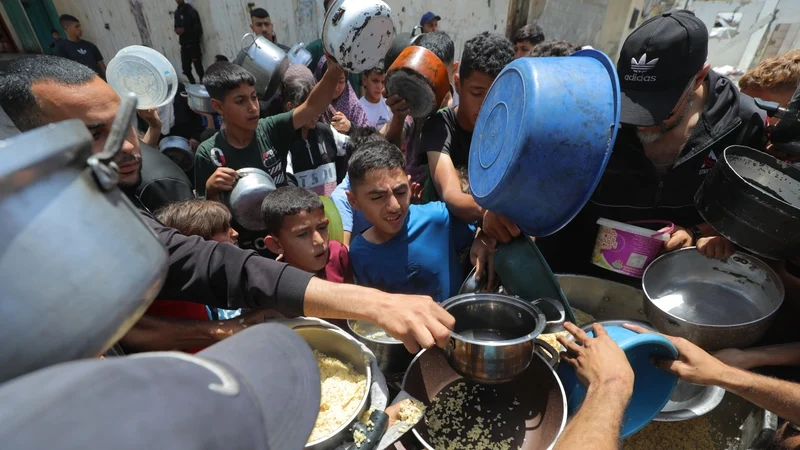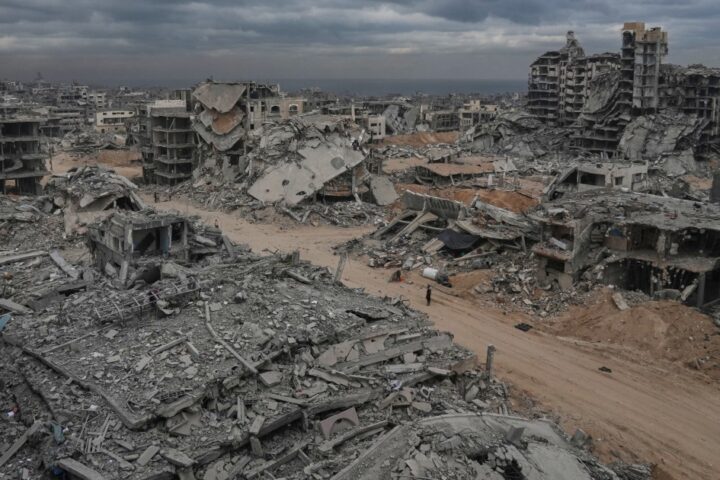Israeli airstrikes have killed at least six Palestinians guarding aid trucks against looters, Hamas officials said, underlining the problems hindering supplies from reaching hungry people in Gaza following Israel’s 11-week-long blockade.
The Israeli military said 107 trucks carrying flour and other foodstuffs, as well as medical supplies, entered Gaza from the Kerem Shalom crossing point.
However, getting the supplies to people sheltering in tents and other makeshift accommodation has been fitful.
So far, an umbrella network of Palestinian aid groups said, 119 aid trucks have entered Gaza since Israel eased its blockade on Monday in the face of an international outcry.
However, distribution has been hampered by looting by groups of men, some of them armed, near the city of Khan Younis, the network said.
“They stole food meant for children and families suffering from severe hunger,” the network said in a statement, which also condemned Israeli airstrikes on security teams protecting the trucks.
A Hamas official said six members of a security team tasked with guarding the shipments were killed.
There was no immediate comment from the Israeli military.

The aid groups network also said the amount of aid coming into Gaza was still inadequate and only included a narrow range of supplies.
It said Israel’s agreement to allow trucks to enter the war-shattered enclave was a “deceptive manoeuvre” to avoid international pressure calling for the lifting of the blockade.
The UN World Food Programme said 15 trucks carrying flour to WFP-supported bakeries had been looted.
“Hunger, desperation and anxiety over whether more food aid is coming is contributing to rising insecurity,” WFP said in a statement, calling on Israel to get far greater volumes of food into Gaza faster, more consistently and safely.
“As WFP has said previously, two million people are facing extreme hunger and famine without immediate action,” it added.
So far, Israel says it has allowed around 300 trucks to enter Gaza, a fraction of the number that aid groups say would be needed to relieve hunger among the population.
But many of the trucks have been held up at the Kerem Shalom crossing and not yet reached people in need, and there has been mounting international pressure to get supplies in more quickly.
A German government spokesperson said the aid was “far too little, too late and too slow,” adding that delivery of supplies had to be increased significantly.
The Israeli military said it had conducted more strikes in Gaza overnight, hitting 75 targets, including weapons storage facilities and rocket launchers.
Palestinian medical services said at least 25 people had been killed in the strikes.
Israel imposed its blockade on Gaza in early March, accusing Hamas of stealing aid intended for civilians, shortly before breaking a two-month-old ceasefire after the two sides deadlocked on terms for extending it.
Hamas has rejected the accusation and says many of its own fighters have been killed protecting the trucks from looters.
WHO chief urges Israel to show ‘mercy’ in Gaza
Earlier, the head of the World Health Organization urged Israel to have “mercy” in the Gaza war and insisted peace would be in Israel’s own interests.
In an emotional intervention at the WHO annual assembly, Tedros Adhanom Ghebreyesus said the war was hurting Israel and would not bring a lasting solution.
“I can feel how people in Gaza would feel at the moment. I can smell it. I can visualise it. I can hear even the sounds. And this is because of PTSD (post-traumatic stress disorder),” said Dr Tedros, who has often recalled his own wartime upbringing in Ethiopia.
“You can imagine how people are suffering. It’s really wrong to weaponise food. It’s very wrong to weaponise medical supplies,” he added.
The Israeli military said a total of 107 aid trucks belonging to the United Nations and other aid groups carrying flour, food, medical equipment and pharmaceutical drugs were transferred yesterday into Gaza.
Dr Tedros said only a political solution could bring a meaningful peace.
“A call for peace is actually in the best interests of Israel itself. I feel that the war is hurting Israel itself and it will not bring a lasting solution,” he said.
‘Systematic’ destruction
WHO emergencies director Michael Ryan said that 2.1 million people in Gaza were “in imminent danger of death”.
“We need to end the starvation, we need to release all hostages and we need to resupply and bring the health system back online,” he said.

“All hostages should be released. Their families are suffering. Their families are in pain,” he added.
The WHO said Gazans were suffering acute shortages of food, water, medical supplies, fuel and shelter.
Four major hospitals have had to suspend medical services in the past week, due to their proximity to hostilities or evacuation zones, and attacks.
Only 19 of Gaza’s 36 hospitals remain operational, with staff working in “impossible conditions”, the UN health agency said in a statement.
“At least 94% of all hospitals in the Gaza Strip are damaged or destroyed,” it said, while north Gaza “has been stripped of nearly all health care”.
It said that across the Palestinian territory, only 2,000 hospital beds remained available – a figure “grossly insufficient to meet the current needs”.
“The destruction is systematic. Hospitals are rehabilitated and resupplied, only to be exposed to hostilities or attacked again. This destructive cycle must end,” it added.
British plastic surgeon Dr Tom Potokar in Gaza said nowhere is safe in the enclave due to regular Israeli bombardment.
Speaking on RTÉ’s Morning Ireland, he said that trying to find intensive care beds is difficult at the moment, but patients on ventilators were able to be transferred elsewhere.
He said bombardments are causing skeletal and soft tissue injuries and people are arriving at hospitals with open wounds, traumatic brain injuries and burn injuries.
Dr Potokar said people had not eaten meat, fruit and vegetables for months and were mainly eating rice, cereal, pasta, but added that those foods are in short supply.
‘Wrong side of history’ – Netanyahu
Israeli Prime Minister Benjamin Netanyahu accused the leaders of France, Britain and Canada of wanting to help Hamas after they threatened to take “concrete action” if Israel did not stop its latest offensive in Gaza.
The criticism, echoing similar remarks from Foreign Minister Gideon Sa’ar yesterday, was part of a fightback by the Israeli government against the increasingly heavy international pressure on it over the war in Gaza.
“You’re on the wrong side of humanity and you’re on the wrong side of history,” Mr Netanyahu said.

As the flow of images of destruction and hunger in Gaza has continued, fueling protests in countries across the world, Israel has struggled to turn world opinion, which has increasingly shifted against it.
“It’s hard to convince at least some people, definitely on the far left in the US and in some countries in Europe, that what Israel is doing is a war of defence,” said former Israeli diplomat Yaki Dayan.
“But this is how it is perceived in Israel and bridging this gap is sometimes an impossible mission,” he said.
Israeli officials have been particularly concerned about growing calls for European countries including France to follow others – such as Ireland and Spain – in recognising a Palestinian state, as part of a two-state solution to resolve decades of conflict in the region.
Mr Netanyahu argues a Palestinian state would threaten Israel and framed the killing of two Israeli embassy staffers in Washington on Tuesday by a man who allegedly shouted “Free Palestine” as a clear example of that threat.
He said “exactly the same chant” was heard during the attack on Israel by Hamas on 7 October 2023.
“They don’t want a Palestinian state. They want to destroy the Jewish state,” he said in a statement on the social media platform X.
“I could never understand how this simple truth evades theleaders of France, Britain, Canada and others,” he said, addingthat any moves by Western countries to recognize a Palestinianstate would “reward these murderers with the ultimate prize.”
Instead of advancing peace, the three leaders were “emboldening Hamas to continue fighting forever”, he said.















